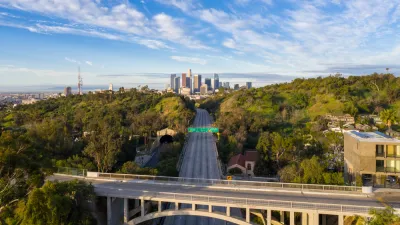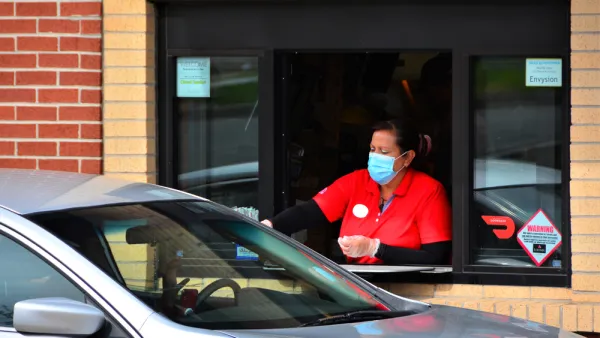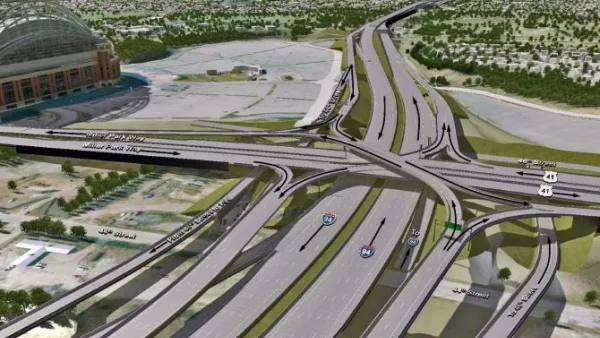We can't go back to the way of life that makes pollution and climate change acceptable, according to multiple articles published on and around Earth Day. It's time for change.

Multiple writers in recent days and weeks have smelled and tasted the clean air in cities during the COVID-19 stay-at-hime-orders and called for collective action to alter the course of humanity. After a clean air experience like this, amidst a crisis worsened by the effects of air pollution, how could humanity return to its normal, polluting ways?
Each of these articles tends to focus on the damage of the transportation status quo, and calls for individuals to make a change in their daily habits.
"We can’t unsee the clearer skies, so let’s incorporate some of the changes we’ve made during the shutdown, such as making fewer trips to the store and for some, perhaps working from home with more regularity," writes Sue McMillin for The Denver Post.
Cars are a frequent source of anti-pollution critiques in these stories. For the Los Angeles Times, Matthew Fleischer writes very specifically to address the cars polluting effect:
So how did we get here? Coronavirus lockdowns, sure. But, to be clear, we’re still burning fossil fuels to power our homes. Many businesses are shut, but essential heavy industries are still up and running. Supply trucks are still delivering goods for us to buy.
The difference is cars. Or lack thereof. Trapped indoors, people are no longer driving their cars anywhere and everywhere.
An article by On Barak for Quartz broadens the car criticism to include the entire fossil fuel economy, calling attention to the failure to truly account for the environmental consequences of human behavior on the global scale:
Most people attend only to one side of the equation that connects coronavirus and oil, to the effect rather than the cause: In this perspective, an epidemic closes factories and grounds airline and marine transportation, slows economic growth and reduces the demand for energy. These effects result in declining oil prices and could potentially ignite price wars that collapse the stock markets. While we obsess about what it may do to our bodies and communities, as far as oil is concerned, the virus is an economic abstraction. Even when we do notice the material aspects of this process, these are usually downstream: the clearing of air pollution over Wuhan or the reduction of greenhouse gas emission resulting from economic slowdown. We have grown so justifiably concerned with climate change and so unforgivably accustomed to fossil energy that we notice it only in its absence.
Finally, an article by Danielle Muoio for Politico frames the need for environmental improvements after the end of the coronavirus in terms of environmental justice.
Black and Hispanic residents have significantly higher death rates from the coronavirus than their white counterparts, often due to higher rates of pre-existing respiratory conditions. Those conditions trace their roots, in part, to living in highly polluted areas of the city.
Muoio reports that New York City Environmental Justice Alliance has recently published its "2020 NYC Climate Justice Agenda," which connects the current experience of COVID-19 with the future experiences of climate change (more on that, here), if cities like New York City don't make drastic changes to reduce pollution and emissions.
FULL STORY: Opinion: Coronavirus shutdowns are making it undeniably clear how toxic our car culture is

Analysis: Cybertruck Fatality Rate Far Exceeds That of Ford Pinto
The Tesla Cybertruck was recalled seven times last year.

National Parks Layoffs Will Cause Communities to Lose Billions
Thousands of essential park workers were laid off this week, just before the busy spring break season.

Retro-silient?: America’s First “Eco-burb,” The Woodlands Turns 50
A master-planned community north of Houston offers lessons on green infrastructure and resilient design, but falls short of its founder’s lofty affordability and walkability goals.

Test News Post 1
This is a summary

Analysis: Cybertruck Fatality Rate Far Exceeds That of Ford Pinto
The Tesla Cybertruck was recalled seven times last year.

Test News Headline 46
Test for the image on the front page.
Urban Design for Planners 1: Software Tools
This six-course series explores essential urban design concepts using open source software and equips planners with the tools they need to participate fully in the urban design process.
Planning for Universal Design
Learn the tools for implementing Universal Design in planning regulations.
EMC Planning Group, Inc.
Planetizen
Planetizen
Mpact (formerly Rail~Volution)
Great Falls Development Authority, Inc.
HUDs Office of Policy Development and Research
NYU Wagner Graduate School of Public Service




























